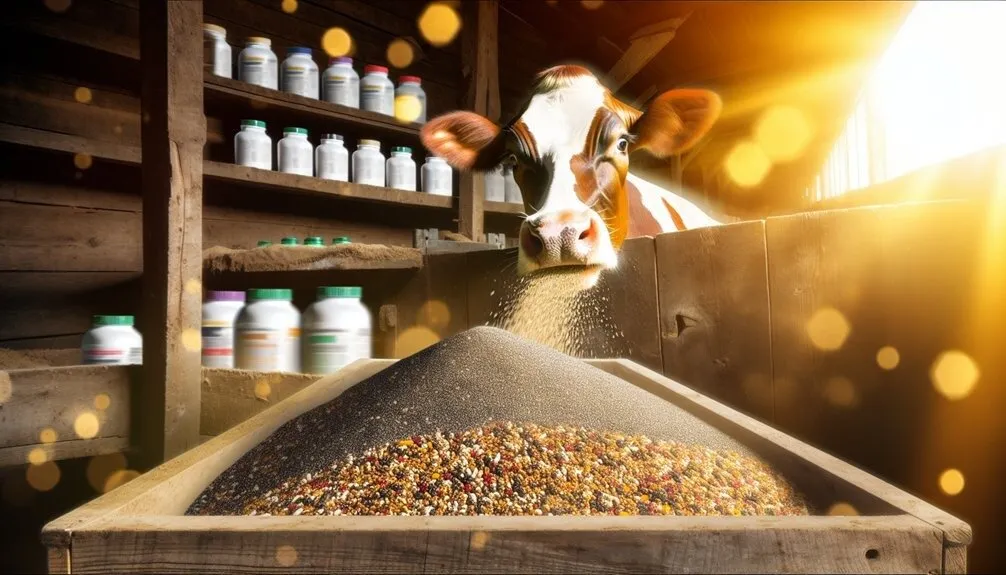
The relationship between what livestock consume and how long they live remains one of agriculture’s most critical yet underexplored dynamics. While farmers have long recognized that proper nutrition affects immediate productivity, emerging research reveals far-reaching implications for animal longevity and lifetime performance. For instance, tailored diets and targeted supplementation have been shown to positively influence horse lifespan by supporting joint health, digestion, and immune function throughout aging. The science behind feed formulation and strategic supplementation exposes gaps in conventional practices, suggesting that minor adjustments in nutritional approaches could yield substantial improvements in herd health, disease resistance, and overall lifespan across various species.
Understanding the Link Between Nutrition and Livestock Longevity
While genetics and management practices play important roles in livestock production, nutrition remains the most significant factor influencing animal longevity and productive lifespan. Proper nutritional balance directly affects immune function, reproduction, and metabolic efficiency in farm animals. Deficiencies in essential nutrients accelerate cellular aging and increase susceptibility to disease, reducing both lifespan and productivity. For instance, using well-formulated goat feed and supplements can significantly improve herd vitality and extend the productive years of dairy and meat goats.
Research demonstrates that animals receiving optimized feed formulations maintain healthier organ systems and experience fewer age-related complications. Key nutrients including proteins, minerals, and vitamins support tissue repair and cellular regeneration throughout an animal’s life. Strategic supplementation addresses gaps in base feed ingredients, preventing nutritional imbalances that compromise health. When livestock receive adequate nutrition matched to their physiological needs, they demonstrate improved stress resilience, enhanced disease resistance, and extended productive years within farming operations.
Essential Nutrients Every Livestock Diet Should Include
Although livestock species have varying dietary requirements based on their digestive physiology and production purpose, all farm animals require six fundamental nutrient categories: water, carbohydrates, proteins, fats, vitamins, and minerals. Water serves as the most critical nutrient, facilitating digestion, nutrient transport, and temperature regulation. Carbohydrates provide primary energy for daily functions and growth, while proteins supply amino acids necessary for tissue development, milk production, and enzyme synthesis.
Fats deliver concentrated energy and fat-soluble vitamins while supporting reproductive health. Vitamins regulate metabolic processes and immune function, with deficiencies causing specific health disorders. Minerals maintain skeletal structure, nerve transmission, and fluid balance. Calcium and phosphorus support bone development, while trace minerals like selenium and zinc enhance immunity. Balanced inclusion of these nutrients prevents deficiencies, optimizes productivity, and extends lifespan across all livestock species.
The Role of Feed Quality in Preventing Disease and Promoting Growth
Feed quality directly determines livestock health outcomes and growth performance by influencing nutrient bioavailability, pathogen exposure, and metabolic efficiency. High-quality feed contains properly balanced proteins, carbohydrates, vitamins, and minerals in digestible forms that maximize absorption. Poor-quality feed harbors molds, mycotoxins, and bacterial contaminants that compromise immune function and trigger disease outbreaks. Contaminated or degraded feed increases oxidative stress, inflammation, and susceptibility to respiratory and gastrointestinal infections.
Conversely, premium feed formulations support robust immune responses, tissue development, and ideal weight gain. Feed processing methods, including grinding, pelleting, and heat treatment, affect nutrient availability and pathogen reduction. Storage conditions also impact quality; moisture and temperature fluctuations promote spoilage and toxin production. Investing in superior feed quality reduces veterinary costs, mortality rates, and production delays while enhancing meat quality and overall herd performance.
How Supplements Strengthen Immunity and Enhance Productivity
Beyond foundational nutrition from high-quality feed, targeted supplements provide concentrated bioactive compounds that directly modulate immune function and metabolic pathways. Vitamins A, D, and E enhance antibody production and cell-mediated immunity, reducing disease susceptibility. Trace minerals like selenium, zinc, and copper serve as cofactors for antioxidant enzymes that neutralize oxidative stress during periods of physiological challenge.
Probiotics and prebiotics optimize gut microbiome composition, strengthening intestinal barrier integrity and preventing pathogen colonization. This improved digestive efficiency increases nutrient absorption, directly translating to enhanced growth rates and feed conversion ratios. Omega-3 fatty acids reduce inflammatory responses, allowing animals to redirect energy from immune activation toward productive functions like muscle development and milk production. Strategic supplementation during critical periods—such as weaning, breeding, and lactation, yields measurable improvements in reproductive performance, offspring robustness, and overall herd productivity.
Balancing Natural and Formulated Feeds for Optimal Results
Successful livestock nutrition programs integrate both natural forages and scientifically formulated feeds, each contributing distinct advantages to animal health and production outcomes. Natural feeds provide essential fiber, promote digestive health, and deliver phytonutrients absent in processed alternatives. Grazing animals exhibit natural behaviors that reduce stress while obtaining minerals directly from pasture vegetation.
Formulated feeds address specific nutritional gaps through precise nutrient ratios tailored to production stages. These supplements guarantee consistent protein levels, energy density, and micronutrient availability regardless of seasonal forage quality variations. Commercial feeds also incorporate vitamins and trace minerals difficult to obtain from pasture alone. The ideal approach combines pasture-based nutrition with targeted supplementation. Producers monitor body condition scores, production metrics, and forage analysis to adjust feeding ratios. This balanced strategy maximizes genetic potential while maintaining cost-effectiveness and animal welfare standards.
Innovations in Animal Feed Technology and Sustainable Nutrition
Recent technological advances have transformed livestock nutrition through precision feeding systems, alternative protein sources, and environmentally conscious formulations. Smart sensors and data analytics now enable farmers to customize feed rations based on individual animal requirements, reducing waste while maximizing nutritional efficiency. Insect-based proteins and single-cell organisms offer sustainable alternatives to traditional ingredients, decreasing reliance on resource-intensive crops like soy.
Fermentation technology produces specialized enzymes and probiotics that enhance nutrient absorption and gut health. Algae-derived supplements provide omega-3 fatty acids without depleting marine ecosystems. Blockchain systems track ingredient origins, ensuring quality and ethical sourcing. These innovations address climate concerns while maintaining livestock productivity. Research continues into bioactive compounds from food processing byproducts, converting waste streams into valuable nutritional resources that support both animal welfare and environmental sustainability.
Long-Term Benefits: Healthier Animals, Higher Yields, and Extended Lifespan
The adoption of advanced nutrition systems and sustainable feed technologies directly correlates with measurable improvements in livestock longevity and productivity. Animals receiving enhanced feed formulations demonstrate improved immune function, reducing disease incidence and veterinary costs. Proper nutritional balance strengthens skeletal development and organ function, extending productive years considerably.
Higher yields manifest across multiple metrics: dairy cattle produce increased milk volumes with superior fat and protein content, while beef cattle achieve optimal weight gain with improved feed conversion ratios. Poultry exhibit better egg production rates and meat quality. Enhanced reproductive performance results in higher conception rates and healthier offspring. Economic benefits compound over time as healthier animals require fewer medical interventions and maintain peak productivity longer. Extended lifespan in breeding stock preserves genetic investments while reducing replacement costs, ultimately improving farm profitability and sustainability.
FAQs
Proper nutrition supports immune function, organ health, and metabolism, helping animals resist disease and live longer, more productive lives.
All livestock require water, carbohydrates, proteins, fats, vitamins, and minerals to maintain health and support growth.
High-quality feed improves nutrient absorption and reduces disease risk, while poor-quality feed can introduce toxins and weaken immune defenses.
Supplements help fill nutrient gaps and can enhance immunity, digestion, reproductive performance, and overall productivity.
Forage provides valuable fiber and natural nutrients, but most herds still need formulated feed or supplements to avoid deficiencies.
Probiotics support a healthy gut microbiome, improving digestion, nutrient absorption, and resistance to harmful bacteria.
Yes. Precision feeding, enzyme additives, and sustainable protein sources can improve efficiency, reduce waste, and enhance long-term herd health.
Yes. Well-balanced nutrition strengthens the body and reduces age-related decline, allowing animals to stay healthy and productive longer.













